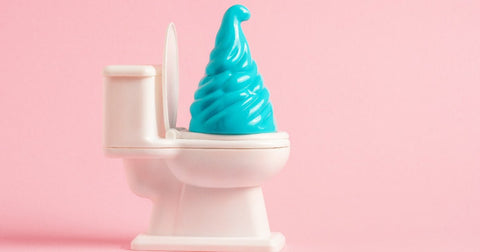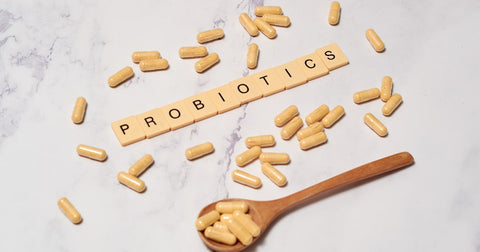Let's be honest, we all poop. It's a natural bodily function. But when your once-reliable bowel movements start resembling something more akin to a smoothie than a solid, well-formed log, it can be alarming and downright uncomfortable.

If you find yourself asking, "Why is my poop never solid anymore?" you're not alone. Let's unravel this mystery and get you back on track to healthier, happier bathroom breaks!
The Scoop on Poop: Why Consistency Matters
First things first, let's clear up what "normal" poop actually looks like. Healthy bowel movements should be well-formed and easy to pass. The Bristol Stool Chart provides a handy visual guide, with types 3 and 4 representing the ideal consistency.
Chronic loose stools or diarrhea signal that something isn't quite right in your digestive system. It's time to play detective and uncover the culprits behind your bathroom woes.
Why Is My Poop Never Solid Anymore? Unmasking the Culprits
Several factors can contribute to loose stools or diarrhea:
- Dietary Changes: Sudden increases in fiber intake, high-fat foods, or artificial sweeteners can wreak havoc on your gut, leaving you with less-than-solid results.
- Food Intolerances: If your gut is sensitive to certain foods like lactose or gluten, consuming them can trigger digestive upset and loose stools.
- Infections: Bacterial or viral infections can cause diarrhea as your body tries to flush out the unwanted invaders.
- Medications: Certain medications, like antibiotics, can disrupt the gut microbiome, leading to changes in bowel movements.

- Stress: Remember those "butterflies in your stomach" before a big presentation? Stress can trigger changes in your gut motility, resulting in loose stools.
What Does Stress Poop Look Like? When Anxiety Hits Your Gut
Stress poop can manifest in various ways:
- Loose and watery: When your fight-or-flight response kicks in, your gut can go into overdrive, leading to loose and urgent bowel movements.
- Constipation: Ironically, stress can also cause the opposite problem, slowing down your digestive system and leading to constipation.
- Abdominal pain and cramps: Stress can make your gut more sensitive, resulting in discomfort and cramping.
If you notice changes in your bowel habits during stressful periods, it's a sign that your gut is feeling the pressure too.
How to Make Poop Solid: Tips to Regain Regularity

Ready to get back to well-formed bowel movements? Here are some strategies to solidify your poop:
- Dietary Changes:
- Increase your soluble fiber intake gradually, with foods like oatmeal, bananas, and applesauce.
- Limit fatty or fried foods.
- Consider a probiotic supplement to support a healthy gut microbiome.
- Hydration: Drink plenty of water to help your digestive system function optimally and prevent dehydration, which can contribute to constipation.
- Stress Management: Practice relaxation techniques like meditation, deep breathing, or yoga to help calm your nervous system and reduce its impact on your gut.
How to Solidify Poop: When to Seek Help
If your loose stools persist for more than a few days or are accompanied by severe abdominal pain, fever, or blood in your stool, it's important to consult a doctor to rule out any underlying medical conditions.
Food Intolerance: A Potential Culprit

If you suspect your loose stools might be due to a food intolerance, consider taking a food sensitivity test. It can help pinpoint specific foods triggering your digestive problems, allowing you to make targeted dietary changes and find relief.
Key Takeaways
- Persistent loose stools or diarrhea can indicate underlying digestive issues.
- Several factors can contribute to changes in stool consistency, including diet, stress, infections, medications, and food intolerances.
- Lifestyle changes, dietary adjustments, and stress management techniques can help improve bowel regularity.
- If symptoms persist, consult a doctor to rule out any underlying medical conditions.
Remember, maintaining a healthy gut is crucial for overall well-being. Don't hesitate to seek help if you're concerned about your digestive health.
Frequently Asked Questions:
1. Is it normal to have loose stools occasionally?
Yes, having loose stools occasionally is not unusual. Many factors, like dietary changes or stress, can cause temporary shifts in bowel movements. However, if loose stools persist or are accompanied by other symptoms, it's important to consult a doctor.
2. Can certain medications cause loose stools?
Yes, several medications, including antibiotics, laxatives, and some antidepressants, can have diarrhea as a side effect. If you suspect your medication is causing loose stools, talk to your doctor about possible alternatives or adjustments.
3. What are some easy dietary changes I can make to improve my stool consistency?
Gradually increase your intake of soluble fiber from foods like oats, bananas, and applesauce. Limit fatty or fried foods and sugary drinks. Stay well-hydrated with water throughout the day.
4. Can stress really affect my poop?
Absolutely! The gut-brain connection is powerful. Stress can trigger changes in gut motility, leading to both diarrhea and constipation. Managing stress through relaxation techniques, exercise, or therapy can positively impact your digestive health.
5. How can a food sensitivity test help with loose stools?
If your loose stools are related to a food intolerance or sensitivity, identifying the culprit food is key. A food sensitivity test can pinpoint these triggers, allowing you to make targeted dietary changes and find relief from your symptoms.


.png?v=1737390083)
.png?v=1737187409)


